OXNARD, Calif. -- The training of Ukrainian Vasyl Lomachenko -- conceived, orchestrated and monitored by his father, with an assist from a psychologist trained in cognitive behaviorism -- is famously idiosyncratic. It includes street skating and juggling, handstands and tennis, which Lomachenko often plays solo, sprinting around the net to return his own lobs. There are marathons and 10K swims in open water. Sparring sessions are comprised of 15 four-minute rounds with 30 seconds of rest in between. Fresh sparring partners rotate in every three rounds, unless, as occasionally happens, they're prematurely overwhelmed by the sheer volume of punches -- every single one recorded and calibrated through the computer chips in his hand wraps -- or beaten into submission.
Once the wraps are removed, the psychological workout commences: a battery of tests and exercises using a reaction timer, small blocks or numerical charts that gained popularity as a diagnostic tool for cosmonauts and Soviet-era pilots.
But my favorite of these exercises might be the simplest: Lomachenko holds his breath.
He trains in an Olympic-sized pool. He'll sprint a lap, then return underwater in a single breath. This goes on for a while. Finally, Lomachenko submerges himself. During this camp, while preparing for fellow two-time Olympic gold medalist, Guillermo Rigondeaux, he stayed under for 3 minutes, 30 seconds.
"What's the longest he's ever gone?" I ask. Andriy Kolosov, the psychologist, relays my question to Anatoly Lomachenko, the father, who's studying the day's data, downloaded and displayed as a bar graph on his laptop. Vasyl threw 2,949 punches over 15 rounds -- average velocity 160.2 km/hour -- with little fatigue. The last round, on a double-end bag, saw him throw 324 punches. It's a good workout. I get the feeling that's why Anatoly -- "Papachenko," as he's called in the camp -- is even indulging my inquiry.
"Four-twenty," he says, in English.
"He held his breath for 4 minutes and 20 seconds?" I respond.
"You have to meet the point of this moment," he says. "When your body tells you there is not enough oxygen, that you have to breathe, that it's important to live, that this is very dangerous to your life situation."
Ah, he means the moment: Where everything melds into one -- the physical and psychological training, the father and the son, genetics and ambition.
"This time," says Kolosov, "you answer for your body -- 'Not now!' You control your instincts. You move the limitation of your instincts."
Maybe you last another second. Or another 10. Or, in the case of Vasyl Lomachenko, 29, you last somewhere between 3:30 and 4:20.
I think I get it now. The left side of his belly bears a tattoo of his father's visage, a little more benevolent than Anatoly appears in person. Above, the legend: "Victory."
If you're Lomachenko, you want to win more than you want to breathe.
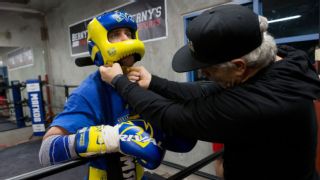
Russ Anber, Lomachenko's cutman, has been working with fighters -- tending to their wounds, their psyches and their hands -- since 1979. The history of fathers and sons in boxing, he readily admits, is "semi-f---ing disastrous."
Semi?
His present employers excluded, I ask him for a happy father-son boxing story. "Off the top of my head?" he responds, "I can't think of one."
There's no boxing equivalent of Little League or Pop Warner. There are no metaphors for violence. As artful as the sport can be, it is violence. Not every parent can put his child in harm's way. The father who works his kid's corner, I tend to find, cares most about himself: his legacy, the balancing of some imagined existential score, an affirmation of the blessings, genetic and otherwise, bestowed upon his progeny.
Fans of a certain age will recall a glowering Joe Frazier trying to stare down Mike Tyson. Seconds later, his son Marvis lay crumpled in the corner. It was the most concise cautionary tale ever seen on network television.
Danny Garcia once told me about losing in an amateur tournament, not long after his father had been released from prison.
"When we got back to the room, he threw me against the wall, and he put his hands around my neck and he said, 'From now on, I'm training you, and if you ever lose again, I'm going to hurt you.'"
Then his father grabbed an iron, putting it to his face. "I'll burn you," he said.
Danny was 11. He didn't lose again until he was 28.
Freddie Roach recalls his father waiting for him in the dressing room after his last pro fight, a lackluster loss in the Lowell Auditorium.
"How could you have been so good," asked Paul Roach, former featherweight champ of New England, "and end up like this?"
That was the last he saw of his father. Now a seven-time trainer of the year, Roach was among the chief seconds that manager Egis Klimas had in mind for Lomachenko when he turned pro in 2012. But Vasyl refused. Nothing against Freddie. Or Garcia. Or any of them. Vasyl understood it was a different game than the amateurs. He understood too the manager's grave reservations about father-son boxing teams. He didn't care.
"No one will train me but my father," he told Klimas. "No one will get credit for what he has already done."
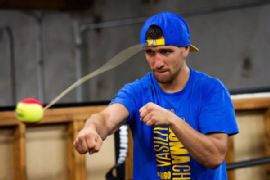
Anatoly wasn't raising a mere fighter, but a prodigy, that most Faustian of bargains, an attempt at perfection. Hence, there might be more apt comparisons for the Lomachenkos.
Pete Maravich, for example, was raised by a coach to be the perfect basketball player. As Pete came of age, his sadness bordered on suicidal. Marv Marinovich tried to create the perfect quarterback, but son Todd wound up a drug addict, instead. Even the great Tiger Woods experiment seems diminished by the knowledge that he fell apart after his father died.
Of course, no story like this would feel relevant without a reference to LaVar Ball and his sons. Their goal, it appears, is to make a lot of noise and sell a lot of sneakers. If Ball seeks perfection, it's in the branding. In other words, not only does LaVar Ball explain the American condition, he's a perfect counterpoint for the Lomachenkos.
Their concern is less commerce than posterity. But their egos are bigger too. All fighters are vain. They spend their working lives rehearsing in front of a mirror, after all. Still, I've never heard an athlete like Vasyl express such outrageous ambition with such sincere shamelessness. His aspiration isn't a title, or several, or even a pound-for-pound designation.
"History," he says. "If, in 10 years, or 20 or 30 years, you sit down with your friends and talk about boxing, you need to remember my name."
By you, he means the grandmothers chewing sunflower seeds as they gossip back in his hometown of Akkerman (the name he calls it, dating to the Ottoman Empire). But he's also referring to guys who'd gather at a barber shop in Queens. Or a gym in L.A. Or a pub in Sheffield. The truth is, Vasyl Lomachenko considers his style, as aggressive as it is aesthetic, superior to Floyd Mayweather's. It's not internet rankings that concern him so much as a kind of immortality, consideration alongside Ray Robinson, Jack Dempsey and, yes, Muhammad Ali. The goal isn't mercantile, but mythic. A famous American sentence, rewritten: There goes Vasyi Lomachenko, the best there ever was. ...
Now that's ego.
But what of its origin?
Vasyl was just three days old when his father, a physical education teacher and boxing coach, put his hands in a pair of gloves. It's not that Vasyl can't remember the first time he went to a gym. He doesn't remember not being in a gym.
"Then whose dream is this," I ask. "Yours or your father's?"
And for the first time in the two weeks I've spent at his camp, I see his ice blue eyes narrow. "It is my dream. Mine."
I inquire, then, as to the nature of his talent. A prodigy -- a John Coltrane or Michael Jordan, for example -- is predisposed to practice longer and harder than the merely gifted. During my time in the Lomachenko camp, I've seen him do everything but take a break.
"My talent is I understand what I want," he says. "I know the price. I understand I need to answer for my words."
Lomachenko doesn't brag. He makes oaths, and keeps them. It runs in the blood. His son, also named Anatoly, was 5 last year when he asked for an iPhone. "You must work for it," Vasyl said. The boy gave his word, and after five months of training, little Anatoly ran from their home in Akkerman to Zatoka, a resort town on the Black Sea. It's about 15 miles, and it took him 2 hours, 15 minutes, according to Vasyl. He got more than an iPhone, though. He learned what his father had, at about the same age. The real joy is in the work, the training.
Danny Garcia wept after he told me of that night in the hotel. Truth is, he wasn't angry at his father. In his own way, twisted or not, he was grateful that it made him a fighter. I think of Maravich, the pathos in his eyes. And this debate about Lonzo Ball, and his oft-discussed, much-alleged passivity. But Vasyl -- even as his father stands over him, counting, calibrating, critiquing every punch -- seems their antithesis.
"Watch him when he smiles," says the cutman, Russ Anber. "It's from the heart."
There's an unmistakable delight with which he trains. He's that rare and most dangerous of fighters: the happy one. And as it pertains to perils of collaboration between fathers and sons, especially those in the anguished history of combat sports, these Lomachenkos might yet prove the glorious exception.
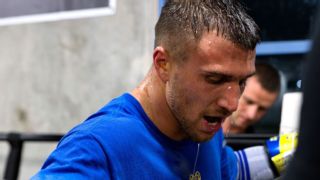
Akkerman, better known as Bilhorod-Dnistrovskyi, is a town of 50,000 with a famous "White Castle" on an estuary leading to the Black Sea. Anatoly once told colleagues he'd like to produce a champion from their hometown, but he didn't want to say more than that.
Anatoly had been, no surprise, an amateur fighter. How good? Or what he might have been? His hopes and aspirations?
"I never asked my father about his dream," Vasyl says. He knew only that his father turned him southpaw before he began sparring. He was 4 the first time. He beat a 6-year-old.
When Vasyl himself was 6, he asked his father if it were better to win an amateur world title or an Olympic gold medal. The gold, said his father. Then gold it would be. It's unclear what his father thought. But the child took it as a vow. "I need to prove it," he says. "To my father and me."
The more he worked, the more apparent were his gifts -- not just ambition, but genetic, as well. While his father had been a boxer, his mother, Tetiana, began as a gymnast. They met while students at the State Pedagogical Institute in Odessa. It was Anatoly who suggested she try judo. After only a year, Tetiana placed fourth in the Soviet judo championships.
Anatoly thought deeply about athletic performance, ideas eventually crystalizing into convictions. It was important for Vasyl to maintain good grades, as an educated body was governed by an educated mind, intellectually stimulated and capable of decision-making under stress. Anatoly never believed in the kind of early specialization so prevalent today. Even as he boxed, Vasyl also played soccer and hockey and wrestled. At 10, he began traditional Ukrainian folk dance.
It wasn't Vasyl's idea, prancing about in a sash, bright boots and billowy satin pantaloons, but it's too much to say his father forced him.
"He explain me," Vasyl says. Such reasoning was typically delivered with an economy of expression, just a deep stare as Anatoly explained cause and effect as inexorably linked facts.
"You want to be a great boxer? he asked.
"Yes."
"Then you must learn to dance."
Vasyl danced two hours every day after school. Then he'd go home for a bite and head to the gym. That was his routine, almost four years in pantaloons. But it endowed him with what he has today, the finest footwork in boxing. Unlike most fighters, Vasyl's was a balanced, harmonious youth. He read a Russian translation of "Tom Sawyer" in grade school. He learned to hunt for pheasant and duck and to fish for carp. "The Fast and the Furious" franchise seems to have contributed to his passion for drifting in supercharged cars (he has a hollowed-out Nissan 240 SX and a Mercedes-AMG C63). His favorite movie, for a time, was "300" -- which accounts for the Spartan warrior tattooed to his back. ("A young mistake," he says sheepishly). His musical taste runs to deep house music. But nothing in his background suggests the depth or the well-mannered ferocity of his desire.
Vasyl's amateur record was 396-1. His single loss to Albert Selimov in 2007 was twice avenged. With his father by then coaching the national team, he won gold in 2008 and again in 2012, one of five medals the Ukraine took home from the London Olympics. Oleksandr Gvozdyk, a bronze medalist now 14-0 as a light heavyweight, says of the elder Lomachenko: "He built a special spirit on that team. He never yells or intimidates, just explain."
Gvozdyk's indoctrination into the Lomachenko method included crossword puzzles as training aids. Learning to walk on his hands. Volleyball. Basketball. Tennis. Marathons and distance swims.
"I have not enough balls to tell him that these things don't work," Gvozdyk says. "People think we're crazy. But these things give you mental supremacy."
Toward that end -- mental supremacy -- Anatoly had hired Kolosov in anticipation of the 2012 Olympics. He was a young Ph.D., a former tumbler, but the bulk of his experience had been working with air force pilots, not fighters.
"I don't need a psychologist," protested Vasyl. For once, Anatoly didn't explain. "You need to believe me," Vasyl said. "My character is strong."
"It's not what you think," said his father. "You don't need to talk to anyone about your feelings."
Eventually, Kolosov became the most prominent voice in the Lomachenko camp, outside of Anatoly. Kolosov was there when Vasyl won the second gold. Kolosov was there when he turned pro, a negotiation with one overriding concern -- not the signing bonus, but whether Vasyl could make history by fighting for the featherweight title in his pro debut.
As it happened, he had to settle for a title shot in his second fight. Orlando Salido's strategy was to come in over the weight limit and foul often. It cost Lomachenko a split decision, but it was also an education and proof that an undefeated record remains the most overrated commodity in boxing.
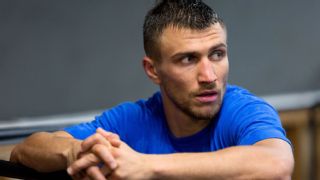
Now, at 9-1, a champion at both featherweight and super featherweight, a victory over Cuban Guillermo Rigondeaux on Saturday night would grant what the House of Lomachenko has long coveted: not just a claim as the best in the world, but everlasting consideration as an historic fighter.
"I've been in the business over 20 years," says Cicilio Flores, the strength and conditioning coach. "He's the most dedicated fighter I've ever worked with."
If the work is hard, it's never predictable. Flores might begin a day by requiring Vasyl to sink 50 3-pointers. His father might have him kick a hacky sack 75 times before it hits the floor. It's not just physical dexterity they're after, but something cognitive. "Mental flexibility," Kolosov calls it.
It's not merely the quantification of every move he makes or the 15 four-minute rounds. In the past weeks, he has gone against champions and sent them home prematurely. He has been wrestled and low-blowed. He'll return a foul quickly, with clinical precision -- a right hook to the cup, followed by a right uppercut -- that leaves his opponent gasping and calling for time. But I never saw him angry or tense.
One night, his father dons a body shield and moves around the ring to imitate Rigondeaux on his imaginary bicycle. After sparring and bag work, it's an exercise in exhausted pursuit, designed to exasperate Vasyl.
"Enough with your bicycle," he tells his father. "I am Rigo!" the father says fiercely.
"No," he says, grinning. "You are Lance f---ing Armstrong."
It's another manifestation of both talent and training -- to remain unprovoked, to resist the tremors and spasms that affect lesser fighters.
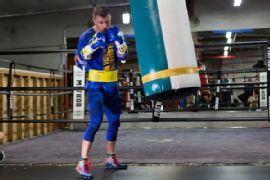
In the fourth round of his most recent bout, against Miguel Marriaga, Lomachenko suffered the first serious cut of his career -- a forked gash that would require eight stitches. Vasyl could see the wound dripping on the monitor between rounds.
"You always wonder about a guy," Anber says. "How he'll react the first time."
In Lomachenko's case, though, he didn't react. Marriaga's corner stopped it after two more rounds.
The cut was another version of The Moment. If this is Anatoly's masterpiece, Kolosov has been called to apply the finishing touches.
"All the pressure in training, it opens you to situational possibility," Kolosov says. "You can't adapt in the ring unless you have the psychic resources. You cannot be tense, or angry or scared. His best ability is to recognize possibility in the ring."
What the shrink is really talking about is creativity.
"For Vasyl, it is art," he says. Vasyl moves like a dancer, never an awkward moment. The punches vary in angle, cadence and power. But there's a rhythm throughout. Kolosov calls it "flow," citing the work of the Hungarian-born psychologist Mihaly Csikszentmihalyi.
In the flow state, individuals are fully engaged in a difficult task, intrinsically motivated, and very happy. Improvisational brilliance is born of repetition. It explains, in some measure, the art of jazz, and it justifies a comparison with Lomachenko's style. But unlike Vasyl, musicians don't create amid violent circumstance.
That said, Lomachenko might have found the perfect opponent. If he represents rhythm and flow, Rigondeaux signifies the opposite: harmony vs. entropy. There's a reason no one wants to fight Rigondeaux, who is also a southpaw. He'll not only make you look bad, he'll brutalize you too. Whatever your tempo, Rigondeaux seeks to disrupt it.
Perhaps that's why he has been trying to provoke Lomachenko -- poking fun at his training regimen and predicting "a massacre."
"We understand why this is happening," Kolosov says. "We teach to understand our opponent, his nuances. Every opening we study. We train to make our activity more cognitive than emotional. Rigo is just a task to us."
Flores is less circumspect:
"Vasyl doesn't play that. I think he feels disrespected."
Prediction?
"Vasyl's going to mess him up. Bad."
Flores has been with the Lomachenkos since their third pro fight, when they beat an undefeated Gary Russell Jr. for the title. He has been there every round since.
During the sparring, Flores takes a seat a few steps from Anatoly. The father counts each punch with a hand-held clicker. Kolosov films the rounds. Flores just watches.
One time, Flores asked the old man, "Did you know what he was going to be?"
"It was all designed," Anatoly says. "It was written down."
But when? When was The Moment?
"Before he was conceived."
